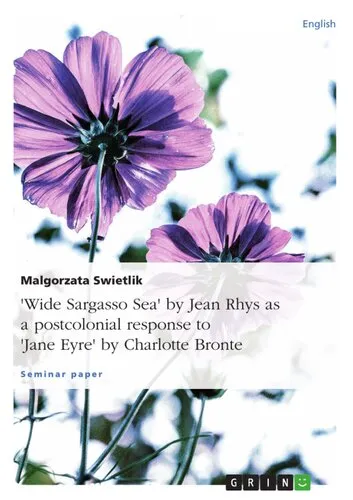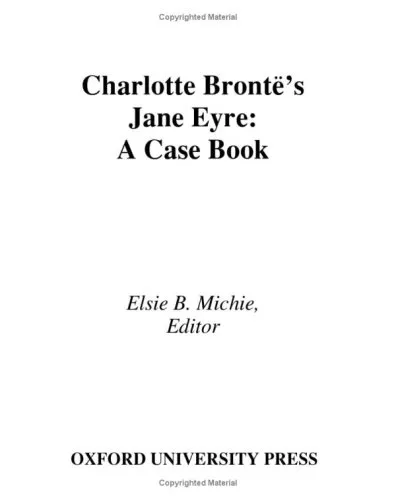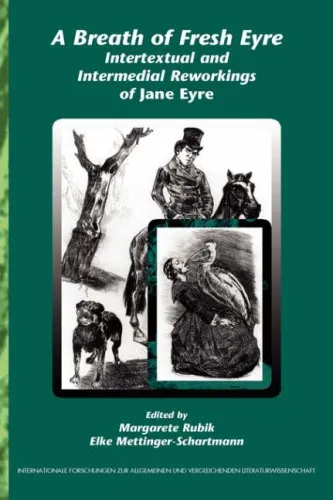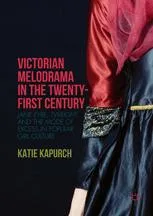"Wide Sargasso Sea" by Jean Rhys as a postcolonial response to "Jane Eyre" by Charlotte Bronte
4.7
Reviews from our users

You Can Ask your questions from this book's AI after Login
Each download or ask from book AI costs 2 points. To earn more free points, please visit the Points Guide Page and complete some valuable actions.Related Refrences:
Jean Rhys' "Wide Sargasso Sea" captures an intense dialogue between postcolonial themes and classical literature by serving as a prequel and response to Charlotte Bronte's "Jane Eyre". This rich narrative reimagines the life and backstory of Antoinette Cosway, who later becomes Bertha Mason—the infamous "madwoman in the attic" in Bronte’s work. Combining lush, vivid descriptions of the Caribbean with deep psychological insight, Rhys transforms a seemingly peripheral character into a central figure, embodying themes of racial and gender dislocation in a colonial context.
Detailed Summary of the Book
Wide Sargasso Sea unveils the tumultuous path of Antoinette Cosway, a white Creole woman growing up in post-Emancipation Jamaica. The novel is divided into three parts. The first part centers around Antoinette's childhood at Coulibri Estate, which reflects the vestiges of colonialism intertwined with societal changes. Her unstable family life and traumatic experiences, including the burning of their house and her mother's subsequent insanity, set the stage for her psychological fragmentation. The second part of the novel depicts her arranged marriage to an Englishman referred to as Mr. Rochester. Acknowledging cultural misunderstandings and Rochester's growing suspicion, their relationship deteriorates, leading him to imprison her first emotionally, then physically. The final part of the novel takes place in Rochester’s English mansion, wherein Antoinette, now referred to as Bertha, recounts her increasingly desperate state of mind. Rhys meticulously contrasts the vibrant aesthetic of the Caribbean with the cold English setting, underscoring Antoinette’s isolation and descent into madness.
Key Takeaways
- The novel serves as a critique of colonialism and racial tensions, portraying the complexity of identity and belonging in a postcolonial world.
- Rhys explores themes of gender and power, highlighting the limited agency of women in patriarchal societies.
- The story deconstructs the narrative of the “madwoman” by providing Antoinette's perspective, thus humanizing and contextualizing her plight.
- Language and setting play crucial roles in illustrating characters' emotions and cultural conflicts.
Famous Quotes from the Book
- "There is always the other side, always."
- "I often wonder who I am and where is my country and where do I belong and why was I ever born at all."
- "They have tricked me and lied to me. A soft voice does not mean good thoughts."
Why This Book Matters
"Wide Sargasso Sea" is far more than a companion piece to "Jane Eyre"; it is an essential narrative in its own right that addresses the marginalization of those who are oppressed by race, gender, and colonial legacies. By delving into Bertha Mason's background, Rhys not only rewrites her into an empowered subject but also challenges readers to reconsider their perspectives on history and literature. This novel resonates strongly within contemporary discourse around postcolonial theory, feminism, and identity politics. Furthermore, Rhys’s work brings forward the impact of environment and heritage on personal sanity and autonomy, encouraging an introspection beyond the mere storyline.
Free Direct Download
You Can Download this book after Login
Accessing books through legal platforms and public libraries not only supports the rights of authors and publishers but also contributes to the sustainability of reading culture. Before downloading, please take a moment to consider these options.
Find this book on other platforms:
WorldCat helps you find books in libraries worldwide.
See ratings, reviews, and discussions on Goodreads.
Find and buy rare or used books on AbeBooks.
1570
بازدید4.7
امتیاز0
نظر98%
رضایتReviews:
4.7
Based on 0 users review
Questions & Answers
Ask questions about this book or help others by answering
No questions yet. Be the first to ask!








